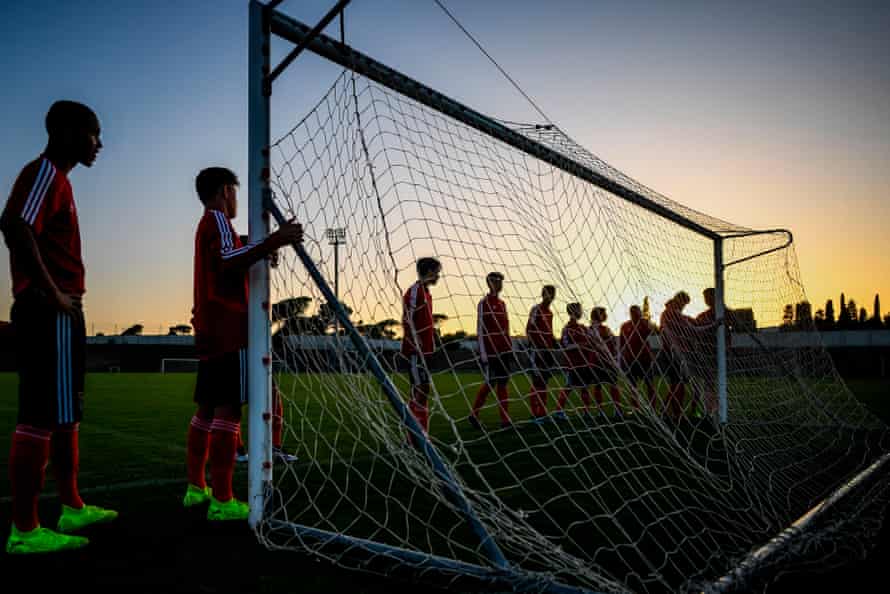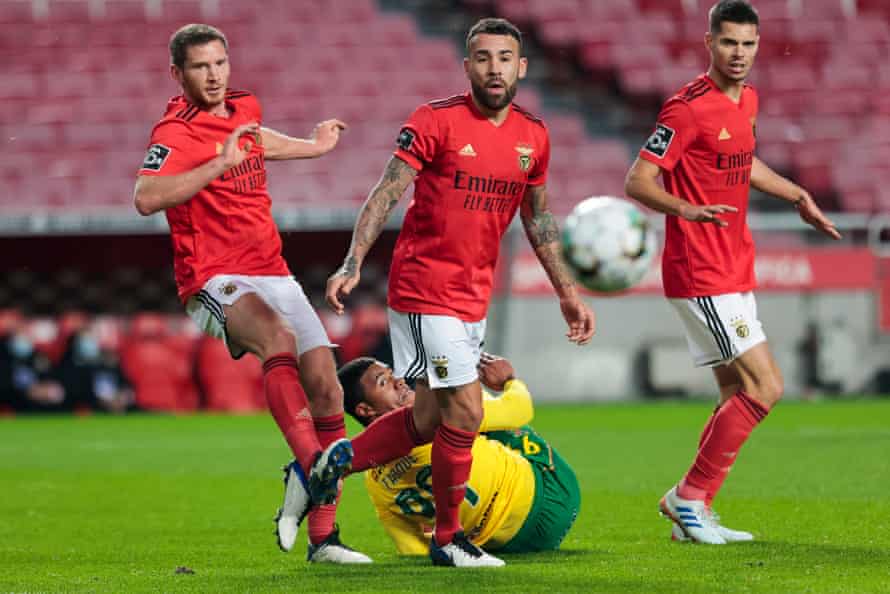“It was a dream come true,” Gonçalo Ramos says of his five-minute Benfica debut last season against Aves. “Only in my dreams would I imagine I’d come on and score two goals.” The forward is leading the new generation of players from the Portuguese club’s academy.
There is plenty of expectation at a club that turned out João Felix, Rúben Dias, Bernardo Silva and João Cancelo. For the players it is about personal ambition but for Benfica the academy is a key part of the business model, proven by the fees earned in recent years from sales.
“All the players in Benfica’s academy, we look at these players as an inspiration, a motivation, and as confirmation that we are in the best place to reach the biggest stages in the world,” says the 19-year-old Ramos, part of the squad that faces Arsenal on Thursday in Athens in the first leg of their Europa League last‑32 tie.
Ramos’s journey began aged nine at one of Benfica’s five satellite training centres in Portugal, near his childhood home in the Algarve, before he moved to Lisbon as a teenager. He was privately educated by the club and his on-field development meant he played every position other than goalkeeper and right-back.
Nine academy graduates are in Jorge Jesus’s first-team squad, including Nuno Tavares, a 21-year-old full-back who played four times in the group stage. As part of their development, youngsters will be given a chance in the B team, who play in the second tier, where Ramos made his professional debut as a 17-year-old.

“Gonçalo is a striker with great physical ability, being able to get to finishing zones and score many goals,” says the Benfica B head coach, Nélson Veríssimo. “He really has a special sense to score goals. He has the attributes to be one of the best talents of Portuguese football.”
The B team are key to making players ready for the rigours of the top flight. “In the younger championships – over an entire season – our players have only two to three games with a high level of difficulty, but in the second division all games have this high level and all games pose great challenges for our players,” Veríssimo says.
He appreciates the importance of the youth setup, having progressed through it in the 1990s before joining its coaching staff almost a decade ago, including a spell as first-team caretaker manager.
The club hope the latest crop can succeed despite fears the pandemic could affect the younger generations. Academy players have missed a year of group training and games, leading to concerns over how to compensate when they are allowed back.
“We felt already a trend in the difficulty of finding talent with society evolving before Covid; now we feel it is going to be more difficult to find those players,” the technical director, Pedro Marques, says. “We just need to concentrate on practice, looking even better and more, and to try then to support and challenge them throughout their development.
“There is a generation who have been home for a year and the ones that are starting to play have other offerings at the moment, so we have to look at how we can get that passion back for the game on a big scale.”

Ramos is joined in the Benfica squad by João Ferreira and Tiago Araújo, part of the team that finished runners-up to Real Madrid in last season’s Uefa Youth League, having beaten Liverpool and Ajax. In addition to those with the first team, the club have high hopes for several others.
“In the national league you have some degree of stimulus but some of these boys have been playing against the same boys generation after generation,” Marques says. “When we go to the Youth League it’s an opportunity to play against different styles, players and tactics and to enjoy the atmosphere around those games. The Youth League is a chance for the boys to play against some of the best academies in the world and test ourselves.”
Benfica sit fourth in the domestic league, a disappointing position considering their enviable history. The experienced squad includes Nicolás Otamendi and Jan Vertonghen, who have 197 caps between them, giving role models to learn from.
“It is important for the young players to get the opportunities and be in and around that environment,” Marques says. “In the academy our mission is to get the players ready to challenge in that environment. It is difficult in every club in the world for an academy player to get promoted and they play all the games. Things take some time but the important thing is the connection with the first team is there for players.”
Ramos is now enjoying the next stage of his education. “In my first year as a senior, it is the best that could happen to me,” the forward says. “Training and having teammates who are top of the world, helps me to grow. Even if they don’t tell me anything, I can learn from what they do; they force me to improve, if I want to overcome them.”
from Football | The Guardian https://ift.tt/3qxT8Le
via IFTTT

No Comment